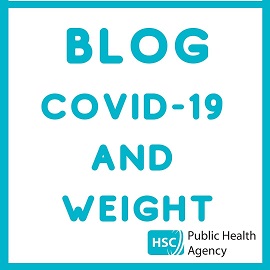The PHA’s Dr Claire Neill and Danny Sinclair discuss what the evidence says about the association between excess weight and COVID-19

Growing evidence suggests that being obese or excessively overweight puts people at greater risk of serious illness or death from COVID-19.
UK and international studies that have been published during the pandemic have been reported by Public Health England in its publication Excess Weight and COVID-19, outlining insights that are becoming available from these new sources of evidence.
Whilst the evidence is – understandably - still developing, observations are supported by mechanisms offering plausible explanations to an association between obesity and COVID-19 outcomes. These include the known effects of excess fatty tissue on heart and lung health, among other functions. It is well publicised that weight-related comorbidities, including type 2 diabetes, cardiovascular and respiratory diseases are associated with more severe COVID-19.
The current evidence does not suggest that having excess weight increases people’s chances of contracting COVID-19 rather that obese people are significantly more likely to become seriously ill and be admitted to intensive care with COVID-19 compared to those with a healthy weight or BMI.
Evidence shows that Black, Asian and Minority Ethnic communities are disproportionately affected by obesity as well as COVID-19.
Gaining weight often happens gradually over time. Most people consume more calories than their body needs. The odd unhealthy habit can result in excess weight gain over time, which puts additional pressure on our bodies. Extra weight causes fat to build up around vital organs, making it harder for the body to fight against diseases like cancer, heart disease and now COVID-19.
The Public Health Agency works to encourage and support all people in Northern Ireland to live healthier lives and reduce their risk of serious illness, including COVID-19. For people who are overweight or living with obesity, lowering their weight can help reduce the risk associated with serious diseases.
There are a number of simple changes that can help people work towards a healthier weight, with a suite of free tools and Apps supporting people to eat better, drink less alcohol and get active. For some, more specialist support may also be needed.
A library of high quality, convenient Apps to support health and social wellbeing has been developed by Health and Social Care (HSC) in NI in partnership with ORCHA (Organisation for Review of Care and Health Apps). The Apps included in the library provide useful support and information on how to manage stress and improve wellbeing, sleep management, staying fit and nutrition –see https://apps4healthcareni.hscni.net.
There are also a range of web based resources developed by the PHA, including our website choosetolivebetter.com which helps people make healthier food choices and learn skills to prevent weight gain.
Useful resources are also available to help with stress, potentially a key factor affecting our lives at the moment. When feeling stressed, many of us reach for chocolate, biscuits or cake as we associate these foods with comfort and reward. These calorie-dense options can provide little nutritional benefit, and lead to increased weight gain over time. If stress affects your relationship with food, you may also find it helpful to consult our stress resources, eg. Stress Control, a programme which teaches skills and techniques for managing stress. This is available online at www.stresscontrol.org, the websites www.mindingyourhead.info and https://covidwellbeingni.info.
COVID-19 has given us a wake-up call to get our health back on track. Whilst many of us have been able to use lockdown as an opportunity to change habits and adopt healthier behaviours, many of us have found it harder to stay healthy during this time.
Supporting individuals to lose weight, and to prevent or slow weight gain across the population, will not only reduce the risk associated with COVID-19, but also brings a range of wider health benefits to individuals and will reduce the pressure on our health service during this vulnerable time.
